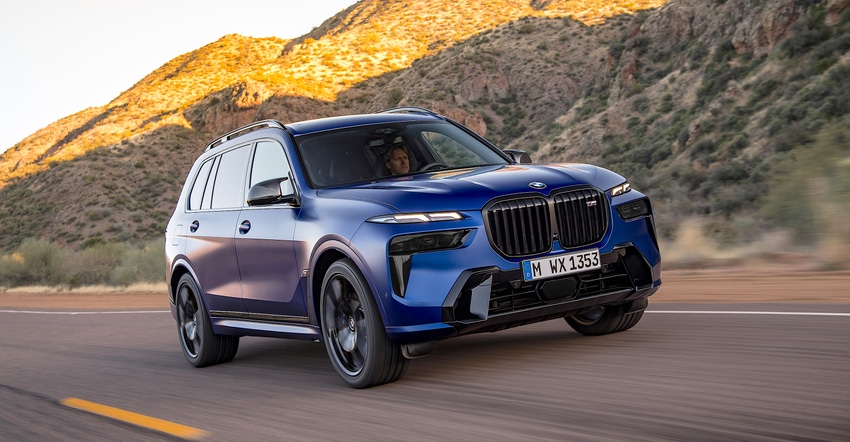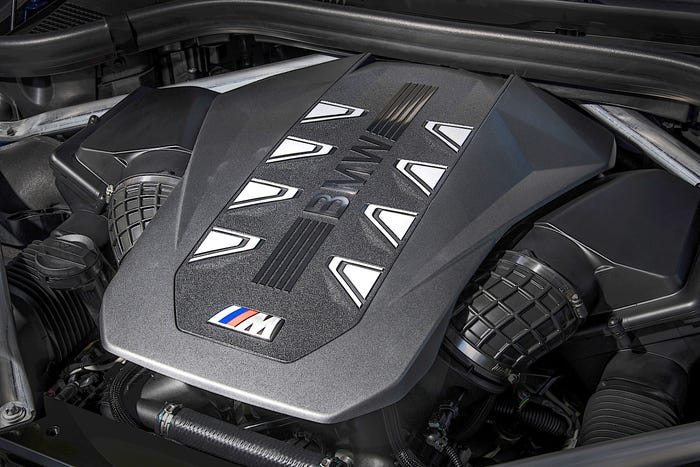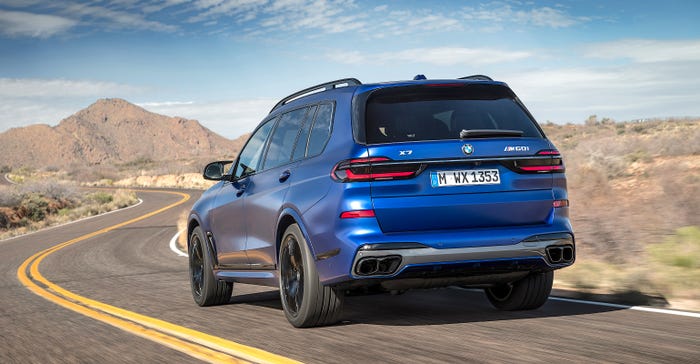Premium brands' largest models serve to premiere technology that will come to the rest of the product line later.

Midsize SUVs are the most popular vehicle category, but the big full-size models are brands’ image and technology leaders, so the introduction of BMW’s new X7 SUV is important to the company.
Naturally, electrification is part of the plan, so BMW is launching the 2023 X7 with 48-volt mild-hybrid systems with all available combustion engines. These start with the X7 xDrive40i’s updated 375-horsepower Miller-cycle 3.0-liter inline-six-cylinder which features innovations in the combustion process, gas exchange, valve control, injection, and ignition system.
These upgrades produce 40 more horsepower than the preceding engine and boost peak torque by 52 lb.-ft. to 383. The 48-volt mild hybrid system adds to that, bringing total torque to 398 lb.-ft. As a result, the XDrive40i accelerates to 60 mph in 5.6 seconds.
The engine’s Miller cycle shortens the opening time of the intake valves compared to conventional Otto-cycle engines, increasing the effectiveness of the turbocharger and its intercooler to increase fuel efficiency. BMW’s Valvetronic fully variable valve control now includes a switchable rocker arm on the exhaust side, which allows gas exchange to be interrupted as necessary.
The BMW X7 M60i employs symmetrical twin turbocharging on its 523-hp, 553 lb.-ft. 4.4-liter V8. This engine propels the M60i to 60 mph in just 4.5 seconds. The engine has been refined with external oil cooling, a reinforced crankshaft drive, an advanced turbocharger blow-off valve, a new oil pump and a weight-minimized oil sump.

The top-of-the-line powerplant is in the Alpina XB7. This is a 630 bhp and 590 lb.-ft. version of the 4.4-liter V8 that can launch the XB7 60 mph in 4.0 seconds and continue to a top speed of 180 mph.
All three engines drive through a new 8-speed Steptronic Sport transmission with launch control and sprint function. The 48-volt electric motor is integrated into the transmission, providing optimized response and power delivery under acceleration as well as increased efficiency due to as much as 0.13 g of regenerative braking. The 48-volt system also noticeably improves the operation of the X7’s automatic start-stop function during idling and coasting situations.
The coasting function with deactivated combustion engine happens when Driving Experience Control mode ECO PRO is selected. The 8-speed transmission incorporates faster gear changes and sharper shift characteristics for a driving experience suitable for a BMW.
Of course, the X7 needs suspension that can handle the engines’ speed. Accordingly, the X7’s adaptive two-axle air suspension combines with electronically controlled dampers to deliver BMW-grade dynamics along with excellent comfort on long journeys.
The X7 M60i xDrive has active steering and active roll stabilization as standard equipment and they are available as options for the X7 xDrive40i. The X7 M60i also benefits from extra-stiff upper mounts for the front axle control arms and specially tuned springs and dampers. Alongside improved steering precision, this results most prominently in sharper agility and cornering dynamics.

The active steering system increases agility at moderate speeds and optimizes stability at high speeds, particularly when changing lanes through speed-sensitive control of a rear-wheel steering system. That means the wheels are turned in either the same or the opposite direction to the front wheels, depending on road speed.
The roll stabilization system at both axles cooperates with the adaptive suspension while considering information from the navigation system, driving style analysis, and camera-based anticipation data to maximize both dynamic prowess and ride comfort.
The adaptive air suspension’s self-leveling function maintains the full range of spring travel when the vehicle is carrying a load, so the active roll stabilization permits a softer air spring setting and increase ride comfort. While driving in a straight line, the anti-roll bars between the wheels are disconnected, allowing a smoother ride. In turns, the active anti-roll bars engage to counter centrifugal force to reduce body roll.
The X7 rolls on gigantic 23-inch aluminum wheels, marking their first availability on a BMW. Standard equipment for the BMW X7 xDrive40i is 21-inch aluminum wheels on 285/45R tires. TheX7 M60i rides as standard on 22-inch M aluminum wheels with 275/40R tires up front and 315/35R tires at the back. The optional 23-inch BMW Individual aluminum wheels are fitted with performance tires measuring 275/35R at the front and 315/30R at the rear.
The base price for the 2023 BMW X7 xDrive40i is $77,850, plus $995 destination while the X7 M60i is $103,100 plus $995 destination Both will be available in the U.S. in the third quarter of 2022, followed by the Alpina XB7 in early 2023.
About the Author(s)
You May Also Like





